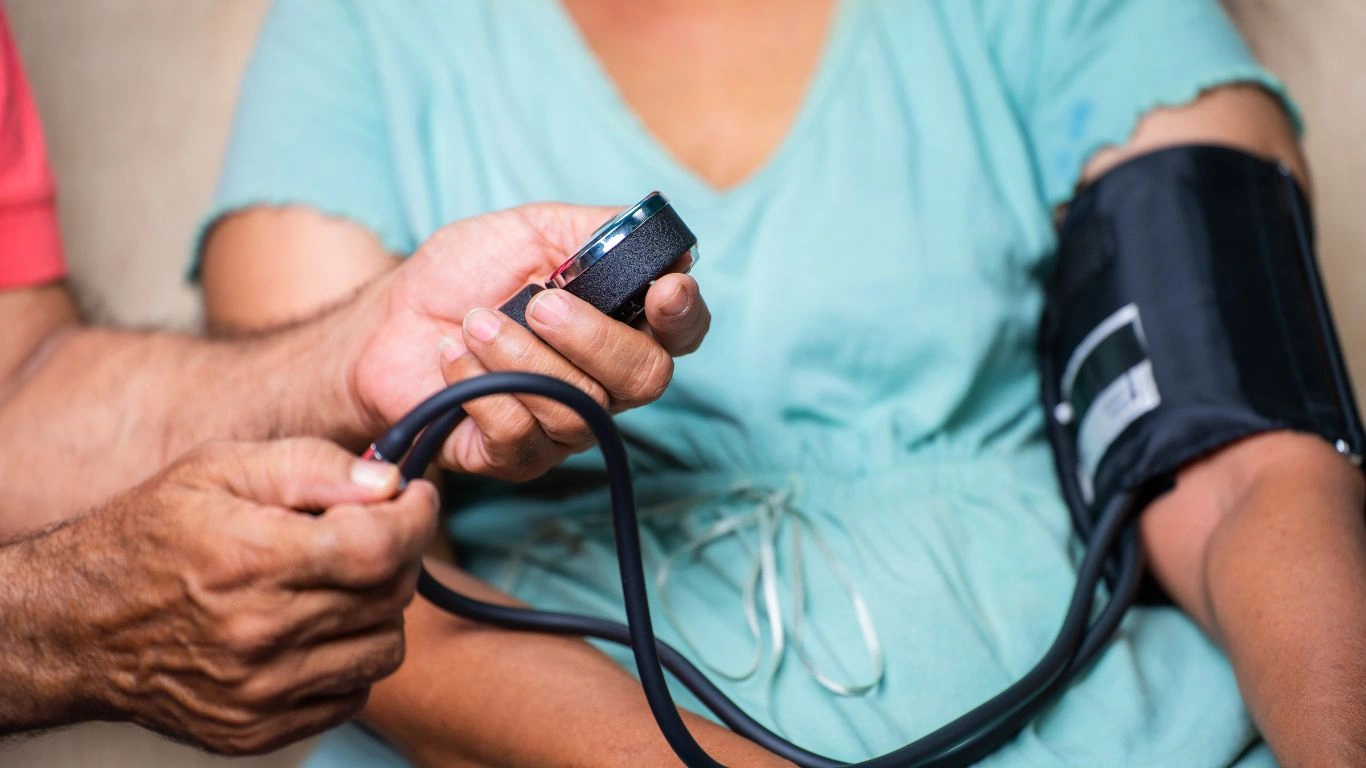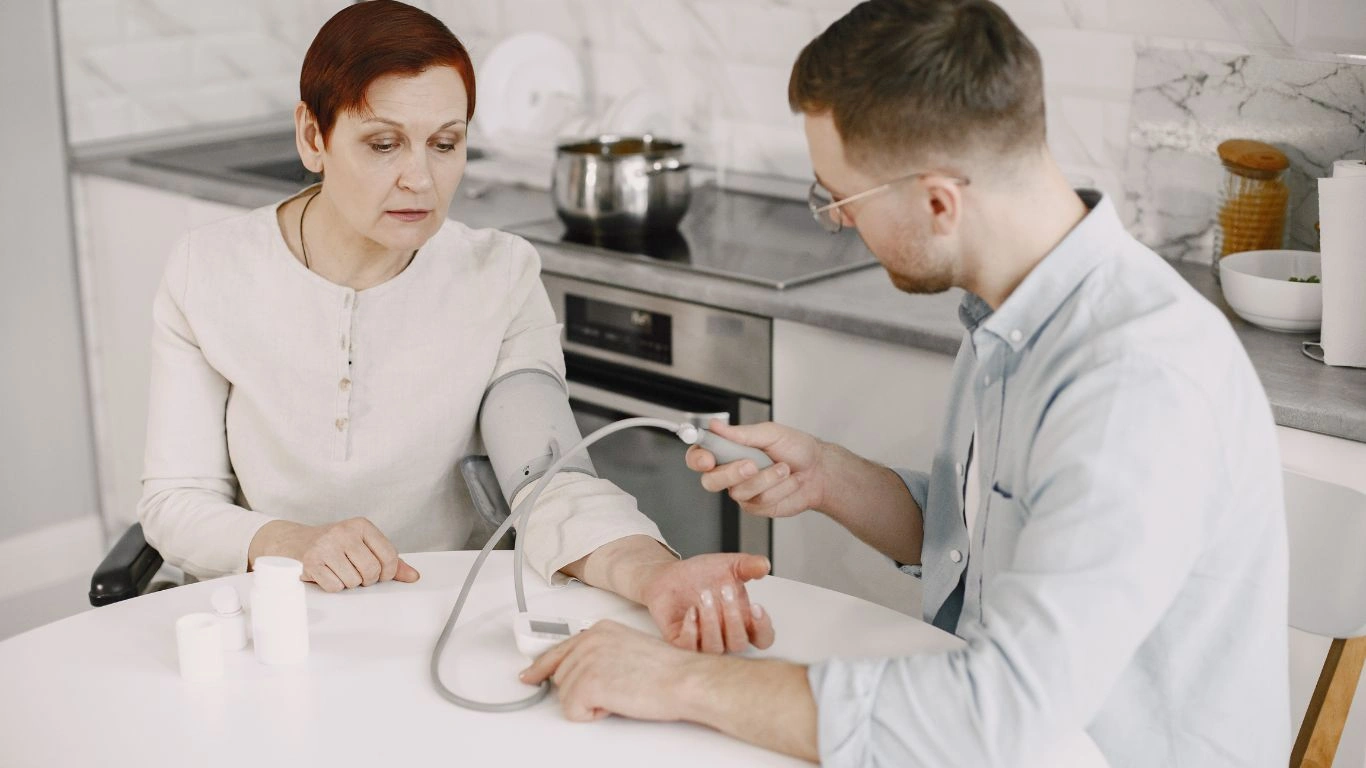Managing Blood Pressure During Menopause: Tips and Strategies 💖
So, you’re going through menopause (or maybe you know someone who is), and now you’ve got the extra challenge of dealing with blood pressure issues. It’s not uncommon, trust me. Menopause messes with our hormones, and unfortunately, that can have an effect on our heart health. But don’t stress! I’m here to walk you through how to manage blood pressure during this phase without feeling overwhelmed.
Why Blood Pressure Might Become an Issue During Menopause 🩺
Here’s the deal: when you hit menopause, your estrogen levels drop, and this hormone does a lot more than just regulate your cycle. It helps keep your blood vessels nice and flexible. So, when estrogen drops, your blood vessels can stiffen, which can lead to higher blood pressure. That’s why women in their 40s and 50s tend to see their numbers creep up.

But don’t worry, you’re not alone. It’s a pretty common thing. And there are definitely ways to keep things under control.
Simple Ways to Keep Your Blood Pressure in Check During Menopause 🍏
1. Eating Right Makes a Big Difference 🥗
You might not want to hear this, but what you eat has a huge impact on your blood pressure. Think of it like fueling your body properly. Try to add more leafy greens (kale, spinach), whole grains, berries, and lean proteins to your meals. These foods are loaded with potassium, magnesium, and fiber—key players in managing blood pressure.
On the flip side, cutting back on processed foods and salt can do wonders. Trust me, I’ve found that the less salty food I eat, the better my blood pressure feels. And don’t even get me started on the magic of reducing junk food. It’s tough at first, but it really does make a difference.

2. Move That Body! 🏃♀️
I get it, the last thing you want to do is jump into a new workout routine, especially when you’re feeling exhausted from menopause symptoms. But exercise is one of the most effective ways to lower your blood pressure. It doesn’t have to be hardcore—go for a daily walk, take the stairs instead of the elevator, or do some yoga. Just get moving! Trust me, you’ll feel so much better, and your blood pressure will thank you.
3. Stress Less, Live More 🧘♀️
Menopause can make you feel like you’re on a never-ending emotional rollercoaster, right? One minute, you’re fine, and the next—bam! Hot flashes, mood swings, and everything in between. Stress is a big factor in raising blood pressure, so finding ways to chill out is key. I swear by deep breathing and mindfulness exercises (even if it’s just for a few minutes a day). Even if you’re skeptical at first, give it a shot. I’ve noticed that even a few minutes of focused breathing can lower my stress levels—and probably my blood pressure, too.

4. Get Enough Sleep 😴
If you’re like me, menopause can mess with your sleep. I used to wake up multiple times a night, drenched in sweat from hot flashes. It’s tough, I know! But poor sleep can push your blood pressure up. Try to stick to a regular sleep schedule, and if hot flashes are keeping you up, try cooling down your room, wearing lighter pajamas, or using a fan. You might not always get the perfect night’s rest, but a little improvement goes a long way in keeping your blood pressure steady.
5. Track Your Blood Pressure Regularly 🩺
Here’s the thing: you can’t manage what you don’t measure. Keeping an eye on your blood pressure helps you stay on top of things. I used to go to the pharmacy for a free check every now and then, but eventually, I bought a monitor for home. It’s super easy to use, and I feel way more in control knowing exactly where I stand.
Troubleshooting Common Issues During Menopause and Blood Pressure ⚠️
Sometimes, despite our best efforts, things don’t go as planned. If you’re still struggling with blood pressure, here are some things you might run into:
Hormonal Rollercoaster
Menopause can be like one giant hormonal rollercoaster, and that can mess with your blood pressure. Fluctuating estrogen levels can cause temporary spikes, leaving you frustrated. If this happens, don’t hesitate to talk to your doctor. Hormone replacement therapy (HRT) might be an option to help balance things out.
Weight Gain Woes
Weight gain is another fun gift that menopause often brings. Unfortunately, excess weight can put more strain on your heart and raise your blood pressure. But here’s the thing—small changes, like a 30-minute walk every day, can help manage your weight. Start slow, and give yourself grace as you go.
Sleep Struggles
If you’re dealing with insomnia, you know how it affects everything—especially your blood pressure. Hot flashes, night sweats, and racing thoughts make it hard to get the rest you need. If you’re still not sleeping well, talk to your doctor about sleep aids or even natural remedies like magnesium supplements. Whatever works for you, the key is to make sleep a priority.
Real-Life Stories: How Women Are Managing Blood Pressure During Menopause 📖
Sarah’s Story
Sarah, 52, noticed her blood pressure was creeping up as she approached menopause. At first, she felt overwhelmed, but she decided to make some lifestyle changes. She switched to a Mediterranean diet, started walking 30 minutes every day, and found a yoga routine that helped with stress. After just a few months, her blood pressure dropped by 10 points, and she felt better than ever.
Maria’s Approach
Maria, 48, was struggling with hot flashes and high blood pressure. She decided to make a few small changes, like cutting back on sodium and practicing deep breathing when stress got overwhelming. After a few weeks, her blood pressure was much more stable, and her hot flashes became less intense. Sometimes, it’s the little changes that make a big difference.
Key Takeaways 📌
Here’s the bottom line: managing blood pressure during menopause is totally possible with the right mindset and lifestyle changes. Eat a balanced diet, stay active, manage stress, and get enough sleep. If you keep tabs on your blood pressure and stick with your health goals, you’ll feel more in control of your body as you navigate this phase.
FAQs 🤔
Q1: Can blood pressure medication make menopause symptoms worse?
It can. Some medications used for high blood pressure might make menopause symptoms like hot flashes or mood swings more intense. Always check with your doctor to see if there are alternative meds or adjustments that work better for you.
Q2: Does menopause automatically mean high blood pressure?
Nope! Not every woman will develop high blood pressure during menopause, but the risk does increase because of hormonal changes, weight gain, and stress. Keep an eye on it, and take proactive steps to stay healthy.
Q3: What’s the best way to reduce stress during menopause?
Try a mix of relaxation techniques like yoga, meditation, and deep breathing. And if you’re into hobbies—gardening, knitting, painting—whatever brings you peace, make time for it. Finding joy in small things is super helpful.
References 📚
- American Heart Association: Hypertension and Women
- National Institute on Aging: Managing Menopause
- Mayo Clinic: Blood Pressure Guidelines
Disclaimer ⚖️
This post is for informational purposes only and shouldn’t replace professional medical advice. Always consult your doctor before making any major changes to your health routine.
Call to Action: Take Control of Your Health Now! 🚀
Managing blood pressure during menopause is totally doable, and you don’t have to go it alone. Start today by focusing on simple habits like eating better, moving more, and finding ways to chill out. And if you’re unsure where to begin, chat with your doctor. You’ve got this!

Dr. Gwenna Aazee is a board-certified Internal Medicine Physician with a special focus on hypertension management, chronic disease prevention, and patient education. With years of experience in both clinical practice and medical writing, she’s passionate about turning evidence-based medicine into accessible, actionable advice. Through her work at Healthusias.com, Dr. Aazee empowers readers to take charge of their health with confidence and clarity. Off the clock, she enjoys deep dives into nutrition research, long walks with her rescue pup, and simplifying medical jargon one article at a time.






